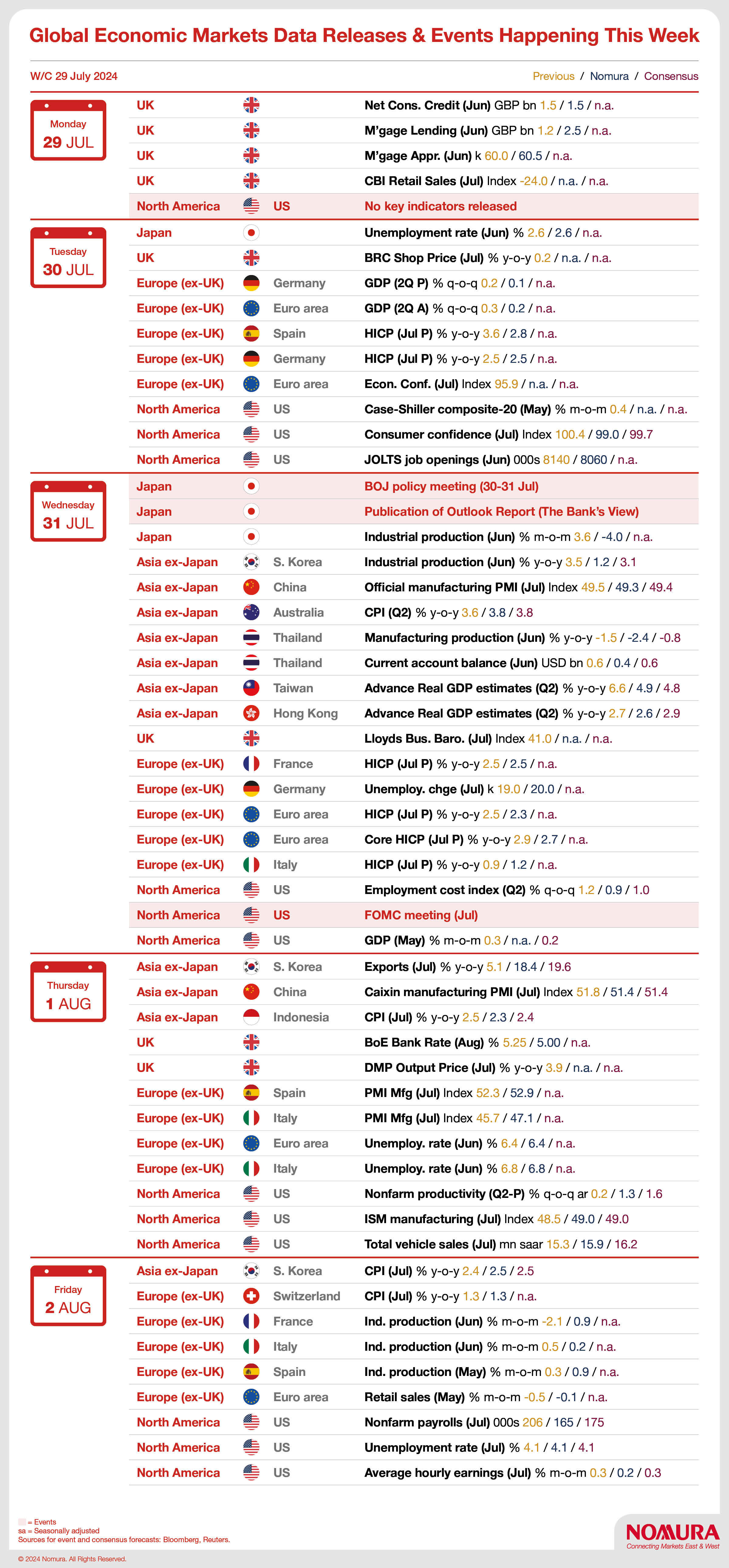What's on the horizon for the global economy?
Our weekly updated overview highlights the key releases of global economic market data from around the globe and provides an economic outlook for 2024 by region.
- Our Week Ahead podcast explores the key themes driving global markets next week
- Our Global Economic Markets Data Calendar shows upcoming events happening over the week
- We provide an outlook overview region by region
Listen to us on
Our view in a nutshell
Japan
- Japan’s economy will likely remain on a recovery path, exceeding potential after contracting in Q1 2024.
- This year’s shunto wage hikes have proved materially higher than last year's, increasing the stickiness of inflation through 2025.
- The BOJ decided to reduce JGB purchases after the July MPM, with the details to be determined at that MPM.
- We expect the BOJ to hike rates in October 2024, with a risk of it being frontloaded to July.
Asia
- We expect GDP growth to continue improving in 2024, due to a sustained goods cycle upturn and steady domestic demand.
- Growth divergences exist: Taiwan, India and Singapore are likely to outperform, while China and Thailand could disappoint.
- Inflation is closer to the trough but should remain within target. Rising freight rates are a risk to goods price inflation.
- Monetary policy divergence is likely. In H2, we expect the RBI, BOK, RBNZ and BSP to cut, CBC to hike and the rest to hold.
- Korea: With more resilient consumption, we expect the BOK to deliver only one 25bp cut in October 2024.
- India: Resilient growth and higher food inflation support extended policy pause, with 75bp of rate cuts from October 2024.
- Indonesia: Populist measures of the incoming government raise fiscal risks while current account deficits continue to widen.
- Australia: We expect below trend growth, rising unemployment, gradually easing inflation and rate cuts from February 2025.
- New Zealand: The economy is cooling and inflation is approaching the target. We forecast rate cuts, commencing in August.
China
- We see new headwinds, such as plummeting equity financing, strengthening tax collection and a financial sector crackdown.
- Ongoing headwinds include fading pent-up demand, property fallout, local government debt and investment in “green” sectors.
- We believe Beijing is headed in the right direction towards ending the housing crisis, as its policy focus shifted to home delivery.
- But this is a daunting task, patience is needed as it takes time for Beijing to fully prepare.
United States
- Gradual disinflation and slowing growth momentum will likely encourage the Fed to begin an easing cycle.
- We expect the Fed to cut rates by 50bp this year (September and December), followed by quarterly rate cuts in 2025.
- Disinflation has resumed. We expect moderating wage growth and slower rent inflation to continue to weigh on service prices.
- Job gains will likely continue to moderate, but there are few signs of labor-market stress or widespread layoffs.
- Risks of inflation reacceleration and a higher neutral rate could lead to a more hawkish Fed in 2024 and 2025.
Euro Area
- We expect an ongoing recovery in GDP in 2024 with growth recovering to 0.4% q-o-q by year-end.
- We see euro area core inflation still above target through 2024-2025 but with services inflation starting to slow from elevated rates.
- The ECB cut rates by 25bp in June 2024. We forecast another 125bp of cuts at a quarterly pace until September 2025.
- The ECB began full roll-off of its APP portfolio redemptions in July 2023. PEPP tapering began in July 2024.
United Kingdom
- UK GDP bounced strongly in Q1 after last year’s weakness. Surveys point to a continuation of positive growth in Q2 and beyond.
- Upside risks: low unemployment, strengthening surveys. Downside risks: past monetary tightening and below-average confidence.
- Headline inflation is back to target, but services inflation is proving more sticky and could take some time to normalise.
- With the BoE dovish in June we’re comfortable with our August cut call; we see quarterly cuts thereafter (3.5% terminal in 2026).
For more information read our weekly report here.
Contributor

Aichi Amemiya
Senior US Economist

George Buckley
Chief UK & Euro Area Economist

Ting Lu
Chief China Economist

Kyohei Morita
Chief Economist, Japan

Euben Paracuelles
Southeast Asia Economist

David Seif
Chief Economist for Developed Markets

Rob Subbaraman
Head of Global Macro Research

Sonal Varma
Chief Economist, India and Asia ex-Japan
Disclaimer
This content has been prepared by Nomura solely for information purposes, and is not an offer to buy or sell or provide (as the case may be) or a solicitation of an offer to buy or sell or enter into any agreement with respect to any security, product, service (including but not limited to investment advisory services) or investment. The opinions expressed in the content do not constitute investment advice and independent advice should be sought where appropriate.The content contains general information only and does not take into account the individual objectives, financial situation or needs of a person. All information, opinions and estimates expressed in the content are current as of the date of publication, are subject to change without notice, and may become outdated over time. To the extent that any materials or investment services on or referred to in the content are construed to be regulated activities under the local laws of any jurisdiction and are made available to persons resident in such jurisdiction, they shall only be made available through appropriately licenced Nomura entities in that jurisdiction or otherwise through Nomura entities that are exempt from applicable licensing and regulatory requirements in that jurisdiction. For more information please go to https://www.nomuraholdings.com/policy/terms.html.
